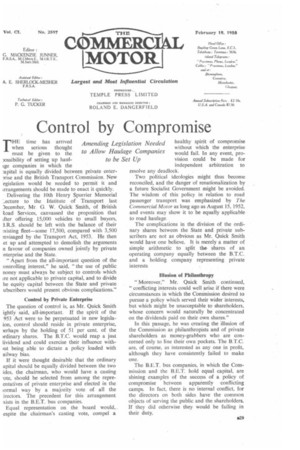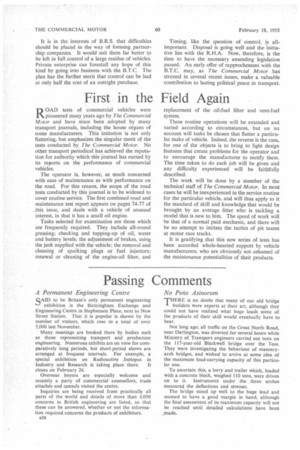Control by Compromise
Page 37

Page 38

If you've noticed an error in this article please click here to report it so we can fix it.
THE time has arrived when serious thought must be given to the )ossibility of setting up haultge companies in which the :apital is equally divided between private enterrise and the British Transport Commission. New egislation would be needed to permit it and rrangements should be made to enact it quickly. Delivering the 10th Henry Spurner Memorial '_,ecture to the Institute of Transport last Xcenaber, Mr. G. W. Quick Smith, of British toad Services, canvassed the proposition that Lfter offering 15,000 vehicles to small buyers, 3.R.S. should be left with the balance of their :xisting fleet—some 17,500, compared with 3,500 ;nvisaged by the Transport Act, 1953. He then et up and attempted to demolish the arguments n favour of companies owned jointly by private nterprise and the State.
"Apart from the all-important question of the :ontrolling interest," he said, "the use of public noney must always be subject to controls which .re not applicable to private capital, and to divide he equity capital between the State and private ubscribers would present obvious complications," Control by Private Enterprise The question of control is, as Mr. Quick Smith ightly said, all-important. If the spirit of the 953 Act were to be perpetuated in new legislaion, control should reside in private enterprise, )erhaps by the holding of 51 per cent. of the Irdiriary shares. The B.T.C. would reap a just lividend and could exercise their influence withput being able to dictate a policy loaded with ailway bias.
If it were thought desirable that the ordinary apital should be equally divided between the two ides, the chairman, who would have a casting 'ote, should be selected from among the repreenta,tives of private enterprise and elected in the lormal way by a majority vote of all the irectors. The precedent for this arrangement xists in the B.E.T. bus companies.
Equal representation on the board would,. espite the chairman's casting vote, compel a healthy spirit of compromise without which the enterprise would fail. In any event, provision could be made for independent arbitration to resolve any deadlock.
Two political ideologies might thus become reconciled, and the danger of renationalization by a future Socialist Government might be avoided. The wisdom of this policy in relation to road passenger transport was emphasized by The Commercial Motor as long ago as August 15, 1952, and events may show it to be equally applicable to road haulage.
The complications in the division of the ordinary shares between the State and private subscribers are not as obvious as Mr. Quick Smith would have one believe. It is merely a matter of simple arithmetic to split the shares of an operating company equally between the B.T.C. and a holding company representing private interests Illusion of Philanthropy "Moreover," Mr. Quick Smith continued, "conflicting interests could well arise if there were circumstances in which the Commission desired to pursue a policy which served their wider interests, but which might be unacceptable to shareholders, whose concern would naturally be concentrated on the dividends paid on their own shares."
In this passage, he was creating the illusion of the Commission as philanthropists and of private shareholders as money-grabbers who are concerned only to line their own pockets. The B.T.C. are, of course, as interested as any one in profit, although they have consistently failed to make one.
The WET. bus companies, in which the Commission and the B.E.T. hold equal capital, are shining examples of the success of a policy of compromise between apparently conflicting camps. In fact, there is no internal conflict, for the directors on both sides have the common objects of serving the public and the shareholders. If they did otherwise they would be failing in their duty. It is in the interests of B.R.S. that difficulties should be placed in the way of forming partnership companies. It would suit them far better to be left in full control of a large residue of vehicles. Private enterprise can forestall any hope of this kind by going into business with the B.T.C. The plan has the further merit that control can be had at only half the cost of an outright purchase. Timing, like the question of control, is allimportant. Disposal is going well and the initiative lies with the R.H.A. Now, therefore, is the time to have the necessary amending legislation passed. An early offer of rapprochement with the B.T.C. may, as The Commercial Motor has stressed in several recent issues, make a valuable contribution to lasting political peace in transport.








































































































